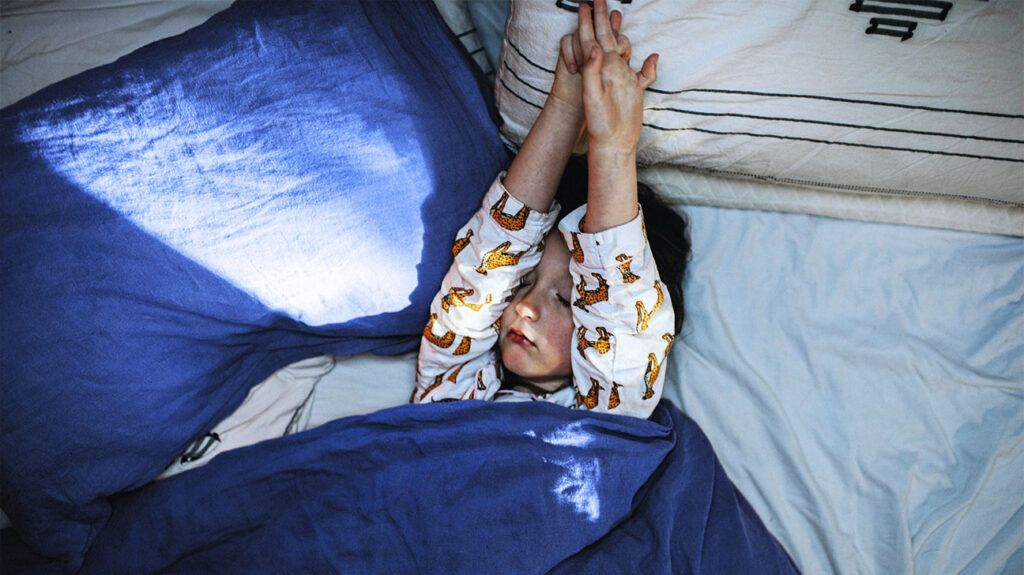Researchers do not yet fully understand why croup tends to be worse at night. Though several theories exist, more research is necessary.
In this article, we will explore why some researchers believe croup symptoms are worse at night, as well as the treatments for croup and how to prevent croup infections. We also discuss when to contact a healthcare professional and answer some common questions about croup.

Croup symptoms are
According to one older review from 2008, the severity of night-time croup symptoms
The review authors suggest one possible explanation for the worsening of symptoms at night may be due to the body’s natural circadian rhythms. These are natural cycles that affect bodily processes, such as hormone levels and temperate regulation, that repeat roughly
One bodily process that circadian cycles influence is the production of cortisol, a stress hormone that the adrenal glands produce. Cortisol can affect how awake a person feels and may play a role in a person feeling agitated or stressed.
A person’s levels of endogenous plasma cortisol (meaning the amount of cortisol in the blood produced by the body) typically peak around 8 a.m. and reach their lowest point between 11 p.m. and 4 a.m.
The review authors note that asthma symptoms also seem to become worse at night for many people. This may be due to the cooling effects of the airways at night, acid reflux, and greater inflammation of tissues in the respiratory tract, alongside the effects of the natural changes in cortisol and epinephrine due to circadian rhythms.
The researchers suggest the worsening of croup symptoms at night may be due to similar factors.
However, scientists have not conclusively proven any of these theories, and more research is necessary to determine why croup symptoms are more severe at night.
The best treatment for croup will depend on the severity of a child’s symptoms.
The United Kingdom’s Nation Health Service (NHS) suggests that for mild to moderate cases of croup, treatment at home includes:
- ensuring the child drinks plenty of fluids
- making sure the child gets lots of rest
- giving the child liquid acetaminophen or ibuprofen to reduce fever and pain
- comforting and reassuring the child and helping them stay calm, as agitation can worsen symptoms
- giving the child an oral corticosteroid, such as dexamethasone or prednisolone, if a doctor prescribes it
For more severe cases of croup, hospitalization
According to the NHS, croup often results from human parainfluenza viruses.
Some steps a person can take to help prevent the transmission of human parainfluenza viruses include:
- washing hands regularly with soap and water for
at least 20 seconds or using an alcohol-based hand rub, if soap and water are not available - avoiding close contact with people who are unwell
- covering the mouth when coughing or sneezing
- staying home if unwell
- avoiding touching the eyes, nose, or mouth
- regularly cleaning and disinfecting objects and surfaces
- wearing a mask
Severe cases of croup may require hospitalization. The NHS advises people should seek immediate medical attention if a child with croup:
- has difficulty breathing, such as very fast or labored breathing
- is too breathless to speak, cry, or walk
- is agitated or distressed
- has a worsening cough or rasping sound
- is paler than usual or has a dark bluish tinge to their skin
- has skin around their ribs and chest that appears to be pulled in and tight, making the bones of their chest and ribs more visible
- is unusually tired, drowsy, or difficult to wake
- is unable to drink any liquids
Below are some common questions and answers about croup.
How do you calm a croup cough at night?
No home remedies treat nighttime croup cough specifically.
However, the NHS suggests that a person should make sure a child with croup gets plenty of rest and fluids. People should also comfort and reassure the child if they become agitated or distressed. They may also administer children’s acetaminophen or other medications as advised by a healthcare professional.
How should a child sleep with croup?
People can try to keep their environment calm and peaceful to make it easier to sleep. A person should comfort a child if they experience distress or agitation, for example, by cuddling and reading bedtime stories.
The NHS advises that children’s acetaminophen may help reduce fever and pain.
Can croup turn into a chest infection?
Croup itself does not cause chest infections.
However, sometimes, the initial viral infection that causes croup can also cause a secondary infection to develop, according to the NHS.
Chest infections can be serious, so it is important to monitor a child for worsening symptoms that may require hospitalization.
Scientists do not yet fully understand why croup symptoms appear to become worse at night. Possible theories from older 2008 research
People should monitor their child’s croup symptoms. If symptoms are severe, they should seek immediate medical attention by calling 911 or going to the nearest emergency room.
